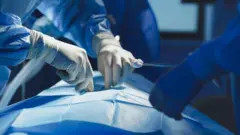In a remarkable medical achievement, Indian Doctors in Delhi successfully conducted a rare and complex surgery to remove a parasitic twin from a 17-year-old boy. This life-altering operation, performed at the All India Institute of Medical Sciences (AIIMS), highlights the expertise and skill of Indian doctors in handling intricate medical conditions.
 Close-up of surgeon with nurse and assistant during operation
Close-up of surgeon with nurse and assistant during operation
Parasitic twins are an exceptionally uncommon occurrence in medical science, developing when one fetus begins to form but then ceases development, remaining attached to a fully formed twin. These cases are so infrequent that medical literature documents less than one in every 100,000 births. The 17-year-old patient presented with a fully developed extra set of limbs and a pelvis, a parasitic twin sustained by a chest artery. The two-hour surgery at AIIMS, a leading medical institution in Delhi, was crucial for the teenager’s health and well-being.
Dr. Asuri Krishna, the lead surgeon and a testament to the capabilities of Indian doctors, emphasized the unique challenges posed by this surgery, particularly due to the patient’s age. “Only 40-50 cases of parasitic twins have been documented in world medical literature, and these were predominantly surgeries on children,” Dr. Krishna explained. The scarcity of comparable cases in adults meant the medical team had to navigate the surgery relying heavily on their collective expertise and medical intuition.
The formation of parasitic twins occurs during the early stages of fetal development when one fetus only partially develops while attached to its twin. In this particular case, the young patient carried a significant parasitic mass weighing approximately 15kg, consisting of two fully formed legs, buttocks, and external genitalia, protruding from his abdomen. Incredibly, these parasitic limbs were capable of feeling sensations, including pain, touch, and temperature changes, further complicating the medical anomaly.
The initial diagnostic step taken by the Indian doctors was to meticulously determine the extent of interconnection between the parasitic twin and the host twin. Advanced scans revealed that the parasitic twin was attached to the teenager’s breastbone and received its blood supply from a chest artery. Crucially, doctors noted that there was limited connection to vital organs like the liver or kidneys, which was a positive factor for the surgical outcome. They also identified a large cyst within the teen’s abdomen, adding another layer of complexity to the surgical plan.
The surgery, expertly executed by the team of Indian doctors, was conducted in two phases. The first stage involved the careful removal of the parasitic twin, followed by the extraction of the cystic mass from the surrounding abdominal organs. A multidisciplinary team comprising radiologists, anaesthetists, and plastic surgeons collaborated to ensure the procedure’s success over two and a half hours.
Dr. Krishna highlighted the delicate nature of the operation, stating, “A network of shared blood vessels, nerves, and tissues had to be meticulously separated. Extreme caution was necessary to prevent any damage to the host’s organs or tissues.” A critical moment during the surgery occurred when the patient’s blood pressure dropped due to a significant portion of his blood flow being diverted to the parasitic twin. However, the experienced Indian medical team was prepared for this eventuality and swiftly stabilized his condition, demonstrating their preparedness and skill in managing surgical complications.
The successful surgery allowed the teenager to be discharged just four days after admission. Dr. Krishna confirmed that the patient is now in good health and has experienced no post-operative complications, a testament to the aftercare provided by the Indian doctors and medical staff.
Before the surgery, the teenager’s unusual physical condition made him a target of social stigma in his community in Uttar Pradesh. He endured gossip and ridicule, which profoundly affected his mental health, leading to isolation and loneliness. He recounted to the Indian Express newspaper the limitations his condition imposed on his life, stating, “I couldn’t travel anywhere or do any physical activity,” and explained his decision to discontinue his education in the eighth grade.
Following the successful surgery performed by the Indian doctors, the 17-year-old expressed immense joy and optimism for his future. He conveyed his eagerness to embrace an active life and pursue his educational aspirations, remarking to the Indian Express, “I hope to study and get a job. A new world has opened up to me.” This surgery not only corrected a rare medical condition but also significantly improved the quality of life for the young patient, underscoring the profound impact of skilled Indian doctors and advanced medical care available in India.

